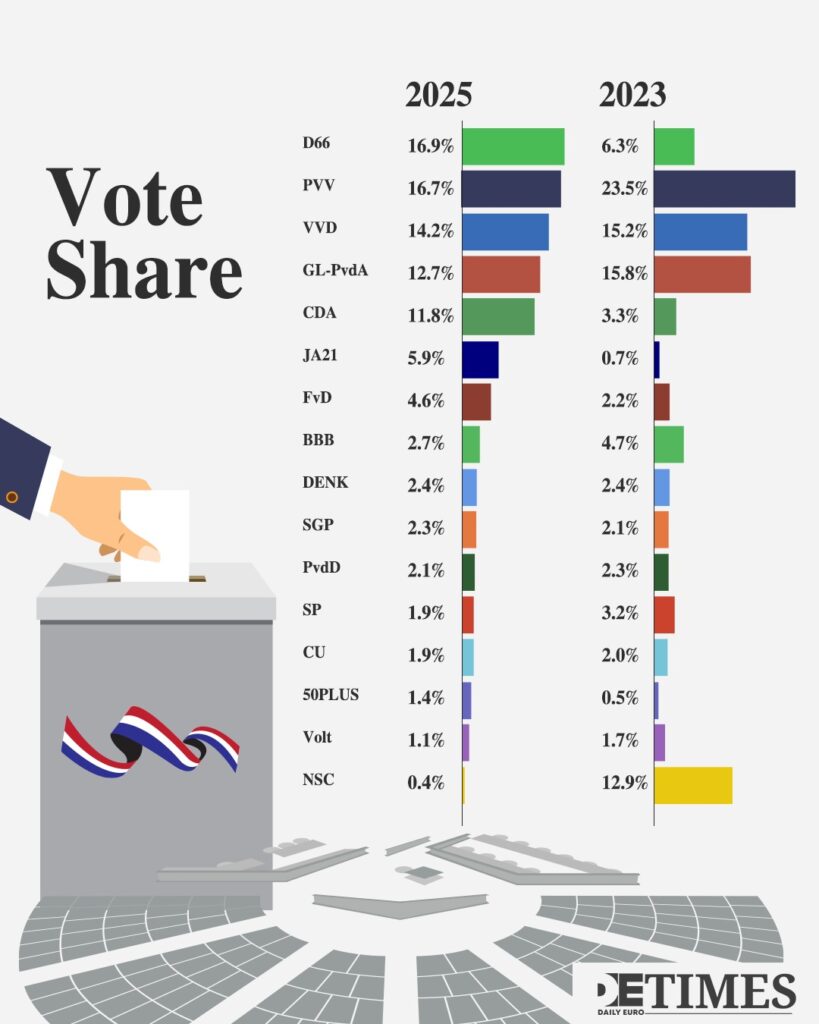Geert Wilders, who brought down the Dutch government last June over his firm stance on migration, now sees his party losing support among voters. His method of stirring fears about migration lost its effectiveness as the public grew tired of leadership that lacked strong achievements.
Wilders called for a plan to close borders to asylum seekers and deport dual nationals with criminal backgrounds. Experts warned that his proposals were difficult to implement and legally uncertain, and coalition partners refused to support these measures.
This political spectacle, without associated reforms, disappointed many voters.
Rob Jetten’s Balanced and Practical Approach
Rob Jetten’s center-oriented party, D66, gained strength by focusing on concrete topics like housing shortages, education, and immigration policies rooted in practicality. His plans to build new towns and streamline building procedures aimed to provide more homes and better living conditions.
Jetten extended D66’s traditional focus on climate issues to also include pressing matters like housing and immigration, attracting voters who sought workable governance grounded in everyday needs.
A Thoughtful Immigration Approach
Jetten combined increased funding for integration with reforming asylum procedures, including accepting claims from outside the European Union. He committed to ensuring refugees would learn the local language and contribute fully to society.
At the same time, he supported removal of individuals destabilising social harmony. His strategy provided policies that addressed concerns without resorting to fear tactics.
He also challenged Wilders’ strategy of dividing society by calling out his attempts to manipulate national identity, an outlook that resonated with many.

Building Consensus and Stable Leadership
Having received support representing significant voter interest, D66 now looks to partner with groups across the political spectrum, such as the Labour-Green coalition, centrist Christian Democrats, and the conservative People’s Party for Freedom.
Almost all potential allies have ruled out cooperation with Wilders, evidencing a desire for steady governance.
Focusing on Tangible Efforts
Healthcare issues gained prominence, with proposals to regulate costly treatments in basic insurance. Jetten emphasised practical reforms in housing, education, and energy, which garnered support from voters seeking reliability in promises.
Preferences shifted toward policies aimed at improving day-to-day living rather than on symbolic or divisive themes.
Lessons for Popular Politics and Governance
Political scientist Henk van der Kolk sees this outcome as a turning point, with D66 gaining influence while Wilders’ support waned. Jetten described a change in mood among voters who rejected negativity and division in politics.
While concerns about migration remain, a strategy involving governance that offers workable solutions has reached a new level of importance. The public questioned the record of those who broke governments over migration without delivering effective policies.
Practical issues like housing availability, health expenses, and rising energy costs directly influence daily routines, and voters are inclined to respond well to efforts that address these concerns.
Jetten presented policies that combined migration management with support for integration, expanded housing, and health care reforms.
The voters responded positively to solutions that offer a semblance of real change.
Keep up with Daily Euro Times for more updates!
Read also:
The Trump Effect: Europe Under Antifa Lobbying Push
A Poison Chalice: Migration Politics in the Netherlands
Lonely in the Middle: How Mass Immigration, Stagnation, and Taxes is Stripping Centrist Politics






